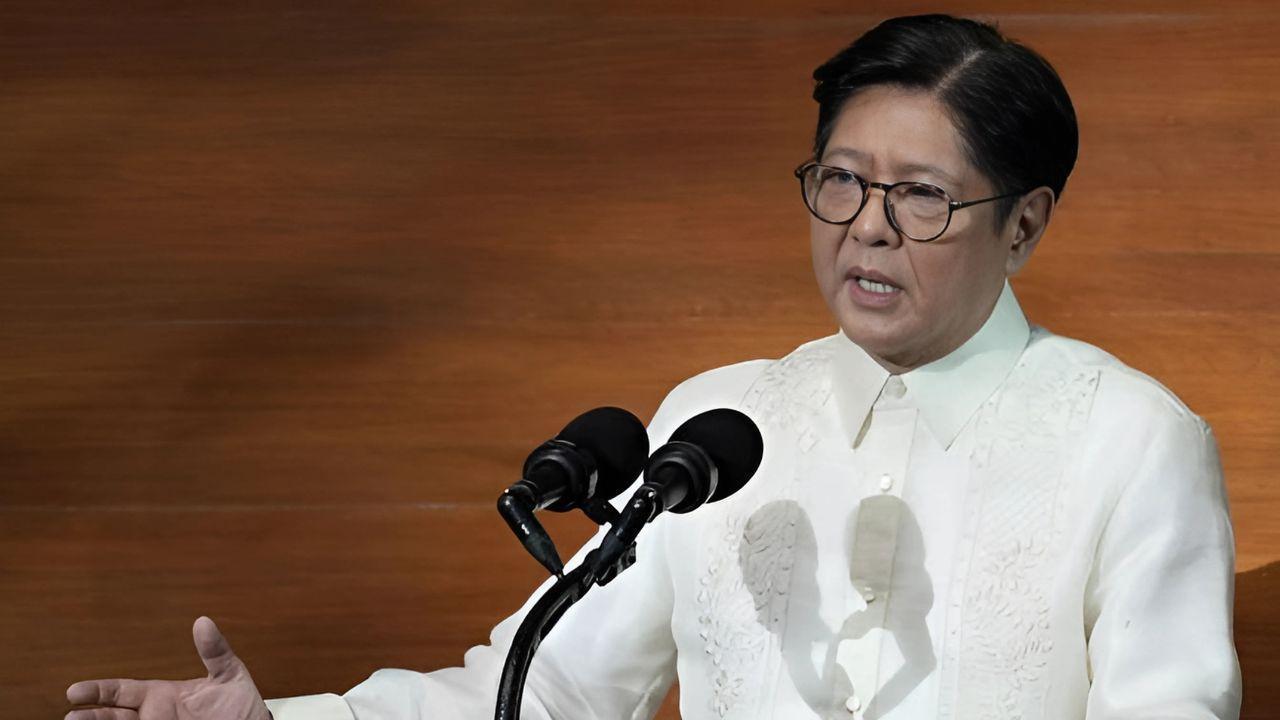
Post by : Priya
Photo:AP
In recent weeks, Philippine President Ferdinand Marcos Jr. has made statements that have captured international attention about the possibility of conflict between China and Taiwan and the Philippines’ inevitable involvement. His remarks, delivered during a state visit to India, highlight complex geopolitical tensions in Asia which could have far-reaching consequences — not only for the region but for the global community.
The Core of Marcos’s Message
President Marcos stated bluntly that if a war breaks out over Taiwan, the Philippines will be "dragged kicking and screaming" into the conflict. This vivid phrase has sparked strong reactions, particularly from Beijing, which accused the Philippines of "playing with fire" and meddling in China’s internal affairs.
What Marcos is emphasizing is not a desire for war but a realistic acknowledgment of the geographic and humanitarian realities his country faces. Taiwan, a self-ruled island, is located just north of the Philippines, and there are over 150,000 Filipino workers currently living and working in Taiwan. The proximity and the presence of so many citizens abroad mean the Philippines cannot stay neutral if a conflict erupts.
Why the Philippines Cannot Stay Out
Marcos explained that if fighting breaks out, the Philippines will be compelled to get involved for several reasons:
Geography: Taiwan borders the northern reaches of the Philippine archipelago, making it almost impossible for the Philippines to remain unaffected strategically or operationally.
Humanitarian Concerns: The more than 150,000 Filipinos working in Taiwan would be in immediate danger. The Philippines must have plans to evacuate and protect its citizens.
Regional Security Dynamics: The Philippines is a key player in the South China Sea region. Tensions here have escalated over the years, especially around disputed areas that both China and the Philippines claim, such as the Scarborough Shoal.
Marcos has stated clearly that the Philippines does not want war but must prepare for the worst-case scenario. He insists the country will be involuntarily pulled into the conflict and must ready its government, military, and civil services accordingly.
China's Reaction: Accusations and Warnings
China’s official reaction was swift and severe. Beijing accused the Philippines of disregarding the One China principle — the policy China uses to assert that Taiwan is part of its sovereign territory — and warned Manila not to interfere in what it calls “internal affairs.” Chinese authorities labeled Marcos’s comments as provocative and cautioned the Philippines not to "play with fire" on an issue that is one of China’s “core interests”.
The Chinese government has repeatedly expressed its strong opposition to any foreign interference in Taiwan affairs and has threatened to use military force if necessary to bring Taiwan under control. The Philippines’ open acknowledgement of a possible involvement in a Taiwan conflict challenges Beijing’s stated red lines.
The Broader Context: The South China Sea and Regional Alliances
The Taiwan issue is not isolated. The South China Sea, a crucial waterway for global trade, is also a zone of intense dispute involving the Philippines, China, Vietnam, Malaysia, and others. China claims most of the sea based on a “nine-dash line,” but an international tribunal in 2016 ruled these claims invalid under international law — a decision rejected by Beijing.
In recent years, Chinese naval and coast guard vessels have been increasingly assertive, sometimes using water cannons and blocking maneuvers against Philippine vessels in disputed waters near the Scarborough Shoal. President Marcos has vowed to defend the Philippines’ territorial rights vigorously, with the navy and coast guard ready to stand their ground.
Simultaneously, the Philippines under Marcos has deepened its security alliances not only with the United States but also with other regional and global partners such as Japan, Australia, India, and certain European countries. These partnerships aim to strengthen deterrence against Chinese assertiveness in the region and ensure the Philippines can safeguard its sovereignty.
Implications for Filipino Overseas Workers and National Security
The safety and welfare of overseas Filipino workers (OFWs), particularly in Taiwan, are paramount concerns motivating the Philippines’ stance. Should conflict erupt, these workers would face grave risks. The government has publicly declared it has evacuation plans to ensure their safe return.
President Marcos’s remarks signal a pragmatic approach: recognition of geopolitical realities rather than political posturing. His government aims to balance maintaining diplomatic relations — officially observing the One China policy — with safeguarding Philippine national interests and the well-being of its citizenry.
What Could Happen Next?
The situation remains fluid and tense. Analysts warn the Taiwan Strait is a potential flashpoint for broader conflict between China and the United States, with countries like the Philippines caught in the middle. China continues to conduct military drills near Taiwan, increasing fears of a possible invasion.
At the same time, Southeast Asian countries are watching closely, as any escalation could destabilize the entire region and disrupt vital international trade routes passing through the South China Sea.
The Philippines faces a tough balancing act: pursuing diplomacy, reinforcing national defense, managing alliances, and preparing for humanitarian contingencies.
Philippines Marcos Taiwan remarks










Alibaba Cloud Leads China’s AI Market with 36% Share
Alibaba Cloud captured over one-third of China’s AI cloud market beating rivals and investing billio

Cambodia Defends China’s Belt and Road as Economic Lifeline
Cambodia praises China’s Belt and Road projects, calling them vital for growth rejecting claims of d

Portugal Norway England shine in UEFA World Cup qualifiers
Portugal beats Hungary 3-2 Ronaldo scores Haaland shines for Norway, Kane leads England in dominant

PV Sindhu exits Hong Kong Open HS Prannoy Lakshya Sen win
PV Sindhu loses early at Hong Kong Open HS Prannoy and Lakshya Sen advance in tough battles India's

Iran Signs New Cooperation Deal with UN Nuclear Watchdog in Cairo
Iran agrees to a new framework with UN nuclear agency resuming controlled inspections after June’s c

Syrian man found guilty for deadly festival stabbing in Germany
A Syrian man inspired by IS was convicted for stabbing people at a German festival, killing three an